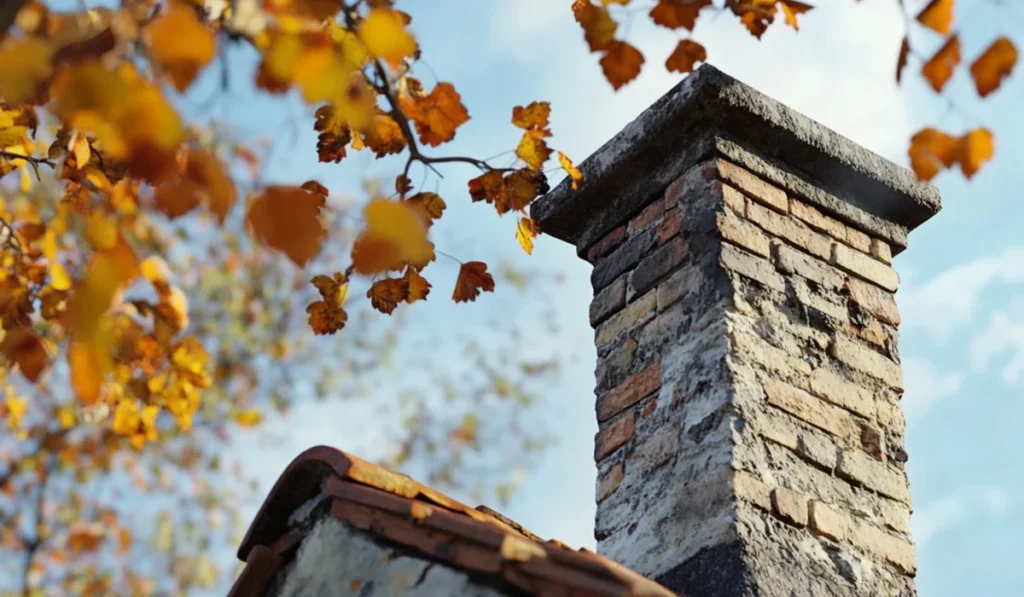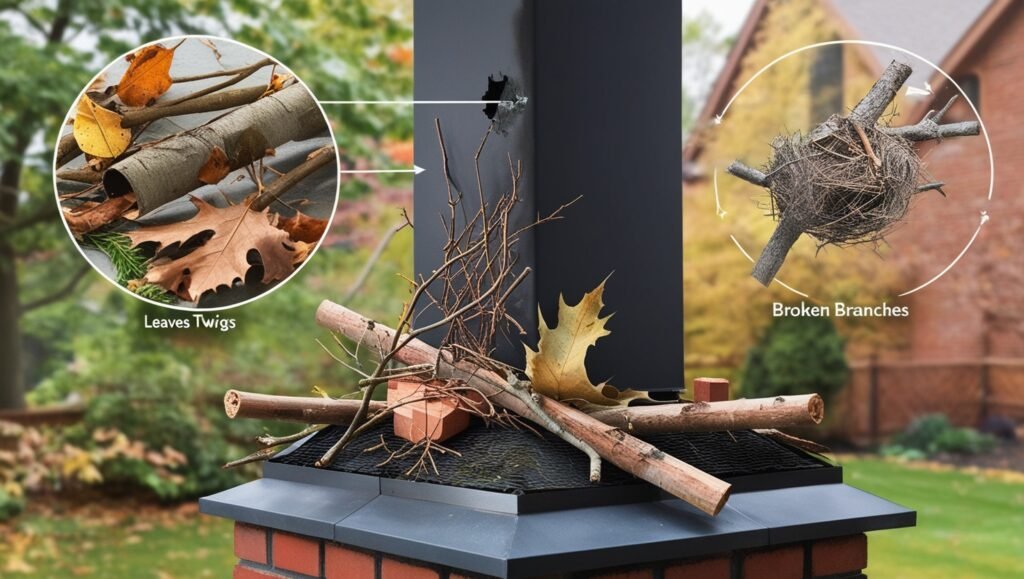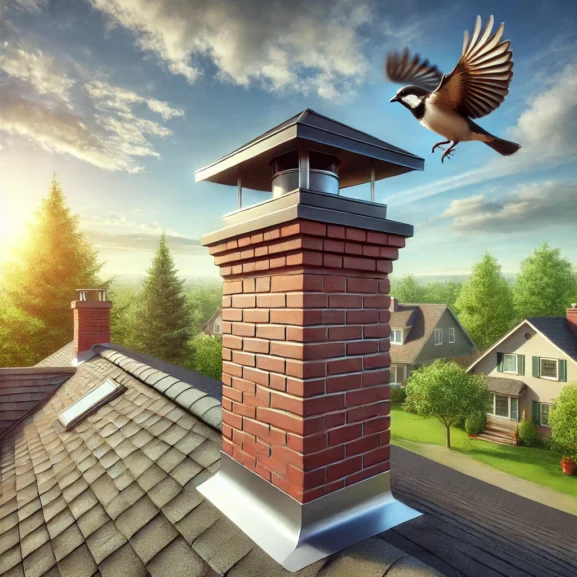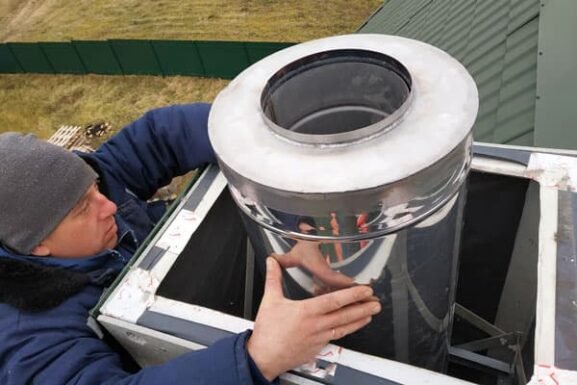Preventing Flue Blockages from Fallen Debris During Strong Winds: Essential Tips & Safety
When strong winds sweep through our neighborhoods, they often leave a trail of chaos in their wake. Among the lesser-known issues they cause, flue blockages from fallen debris can pose a significant risk to our homes. These blockages can lead to dangerous situations, such as carbon monoxide buildup or reduced heating efficiency.
As homeowners, it’s crucial we understand the impact of wind-driven debris on our chimneys and flue systems. This article delves into how these blockages occur, the potential dangers they bring, and practical steps we can take to prevent them. By staying informed, we can protect our homes and ensure our families’ safety during stormy weather.

Flue Blockages Explained: Causes and Solutions
Strong winds can play havoc with our chimneys, often causing flue blockages. This not only jeopardizes chimney safety but also creates wind-related hazards. Let’s jump into the causes and cues of these pesky blockages.
Causes of Flue Blockages
Flue blockages from fallen debris are quite common during severe storms. Here’s what to keep an eye out for:
- Leaves and Twigs: These often get caught in the chimney flue, forming a blockage.
- Broken Branches: Strong winds can send larger pieces of debris tumbling down your chimney. It’s like nature’s version of Tetris, but not quite as fun.
- Bird Nests: Our feathered friends sometimes find chimneys an inviting spot, especially when winds topple nests into the flue.
Blockage prevention involves regular chimney inspection and seasonal cleaning. Our blustery weather means making flue maintenance a priority. Take appropriate action and secure your chimney’s cleanliness.
Common Signs and Symptoms
Detecting a blocked flue early can save you from headaches later. Look for these signs:
- Smoke Indoors: Your room resembling a 1980s rock concert isn’t ideal. Smoke should head upwards, not sideways.
- Reduced Heat Output: Notice any chill creeping in? This could be due to flue blockages stifling your heating.
- Unpleasant Odors: A whiff of something funky? Could be debris or soot building up in your chimney.
Regular inspection helps catch these issues. Contact a professional for chimney safety—we don’t recommend DIY approaches in this case.
Impact of Strong Winds
Strong winds can turn a cozy chimney into a funky flue-blocking festival. During these gusty occasions, fallen debris finds a new home, creating blockages and causing all sorts of mischief. A blocked flue isn’t just a nuisance; it’s a genuine wind-related hazard.
How Strong Winds Contribute to Debris Accumulation
When strong winds blow through, they love collecting items to drop down chimneys. This isn’t a good surprise, like finding money in your pocket; it’s more like discovering a family of twigs taking over your flue. Most of this debris doesn’t originate from far away. Surrounding trees generously donate leaves, branches, and other goodies during storms. Even the best chimney cap might struggle under a gusty onslaught.
These elements collect quickly, creating blockages that mean regular flue maintenance becomes necessary. If left unchecked, the debris can lead to increased carbon monoxide levels in your home. Reach out to certified professionals for expert chimney inspection and blockage prevention advice.
Types of Debris Typically Involved
Strong winds seem to have a favorite selection of debris. They often blow in leaves, twigs, and small branches straight from your very own yard. These usual suspects are joined by the occasional bird nest or two, making their new home in the warmth of your chimney.
- Leaves and Twigs: These start piling up quickly and can cause dangerous blockages.
- Broken Branches: Larger pieces that get stuck can block chimneys efficiently.
- Bird Nests: Birds sometimes take advantage of the chaos, setting up their homes inside your chimney.

Prevention Strategies
Strong winds and fallen debris can wreak havoc on chimneys, leading to flue blockages. Let’s explore strategies to keep chimneys safe and efficient.
Regular Maintenance and Cleaning
Consistent flue maintenance is crucial for preventing blockages. Dust off that Sherlock Holmes hat and think of chimney inspections as a detective mission to spot issues early.
- Chimney Inspection: Schedule annual inspections to catch potential problems before strong winds bring more debris. This keeps blockages from sneaking up like a gusty breeze.
- Seasonal Cleaning: Engage professionals for seasonal cleaning, not just a Thanksgiving facelift. This helps ensure all leaves and twigs vanish before winter storms create wind-related hazards.
- Debris Removal: Professionals can ensure thorough debris removal, preventing accumulation that leads to dangerous blockages.
Spring is an ideal time for a maintenance checkup. reach out to certified professionals now for consultation!
Installing Protective Barriers
Protective barriers are the shield against debris’ dastardly schemes. These installations defend chimneys from looming invasions.
- Chimney Caps: Caps act like helmets, blocking unwanted materials before they sneak inside. It’s smart protection against nature’s tantrums.
- Spark Arrestors: Without turning into Captain Underpants, these heroic devices prevent falling debris from entering while stopping embers from escaping.
- Bird Guards: Shield against feathered squatters setting up camp, leading to blockages and headaches.
Importance of Professional Inspection
Professional inspection ranks high in chimney safety, especially with flue blockages from strong winds. Fallen debris can surprise us, but with expert help, we stay prepared.
Benefits of Expert Services
Expert services bring peace of mind. Pros identify hidden dangers and address chimney blockages from seasonal storms. These specialists know flue maintenance and blockage prevention techniques, ensuring a clear path for smoke and gases. Hiring professionals means we avoid the DIY route, which can lead down a smokey path. For extra assurance, our seasoned experts check the chimney’s wear and tear.
Professional services often include:
- Thorough chimney inspection
- Effective debris removal
- Recommendations for future blockages
Take the proactive step. Learn more about how professional care enhances safety by visiting Chimney Safety Institute of America.
Choosing the Right Professional
Selecting the right professional isn’t just about finding anyone with a ladder. Look for certified inspectors with a strong safety track record. Fall leaves and stubborn twigs are common, so local experience matters. Choosing a knowledgeable expert means having someone who understands wind-related hazards and the peculiarities of our area.
Tips for choosing:
- Ensure certifications and training
- Check reviews for proven expertise
- Prioritize local knowledge for your area’s climate
Want more details on hiring the right chimney expert? Explore insights from the National Fire Protection Association.
The Importance of Preventing Flue Blockages from Fallen Debris
Addressing flue blockages from fallen debris during strong winds is crucial for maintaining safe and efficient home heating systems. By understanding the risks and taking proactive measures, we can protect our homes and families from potential hazards like carbon monoxide buildup. Regular inspections and cleanings by certified professionals ensure our chimneys remain clear and functional. We must prioritize these preventive actions, especially in areas prone to severe weather. By choosing knowledgeable experts and scheduling routine maintenance, we’re investing in our home’s safety and efficiency. Let’s stay informed and vigilant to enjoy a warm and secure living environment.
Frequently Asked Questions
What are the main causes of flue blockages in chimneys?
Flue blockages are primarily caused by leaves, twigs, broken branches, and bird nests. These elements accumulate particularly after severe storms, when strong winds dislodge debris from surrounding trees and allow it to settle in chimneys.
Why is it important to address flue blockages quickly?
Addressing flue blockages is essential because they can lead to carbon monoxide buildup and decreased heating efficiency. These blockages can cause safety hazards, such as smoke entering the home, and affect the performance of heating systems.
How can homeowners prevent flue blockages from occurring?
Homeowners can prevent flue blockages by scheduling regular chimney inspections and cleanings. It’s important to remove any debris, such as leaves and bird nests, and ensure a clear path for smoke and gases.
What signs should homeowners look for to identify a blocked flue?
Signs of a blocked flue include smoke indoors, reduced heat output, and unpleasant odors. Homeowners should be vigilant for these warning signs and seek professional help if any are present.
Why should homeowners hire professionals for chimney inspections?
Professionals can identify hidden dangers and effectively remove debris, ensuring a clear chimney flue. Certified inspectors with local experience can provide reliable safety assessments and maintenance, avoiding potential hazards and inefficiencies.
How can homeowners choose the right chimney inspector?
To choose the right inspector, homeowners should check certifications, read reviews, and ensure the inspector has local experience, particularly in areas prone to seasonal debris.
Are there any recommended resources for chimney safety and maintenance?
Yes, homeowners can refer to the Chimney Safety Institute of America and the National Fire Protection Association for comprehensive guidance and resources on chimney safety and maintenance practices.


